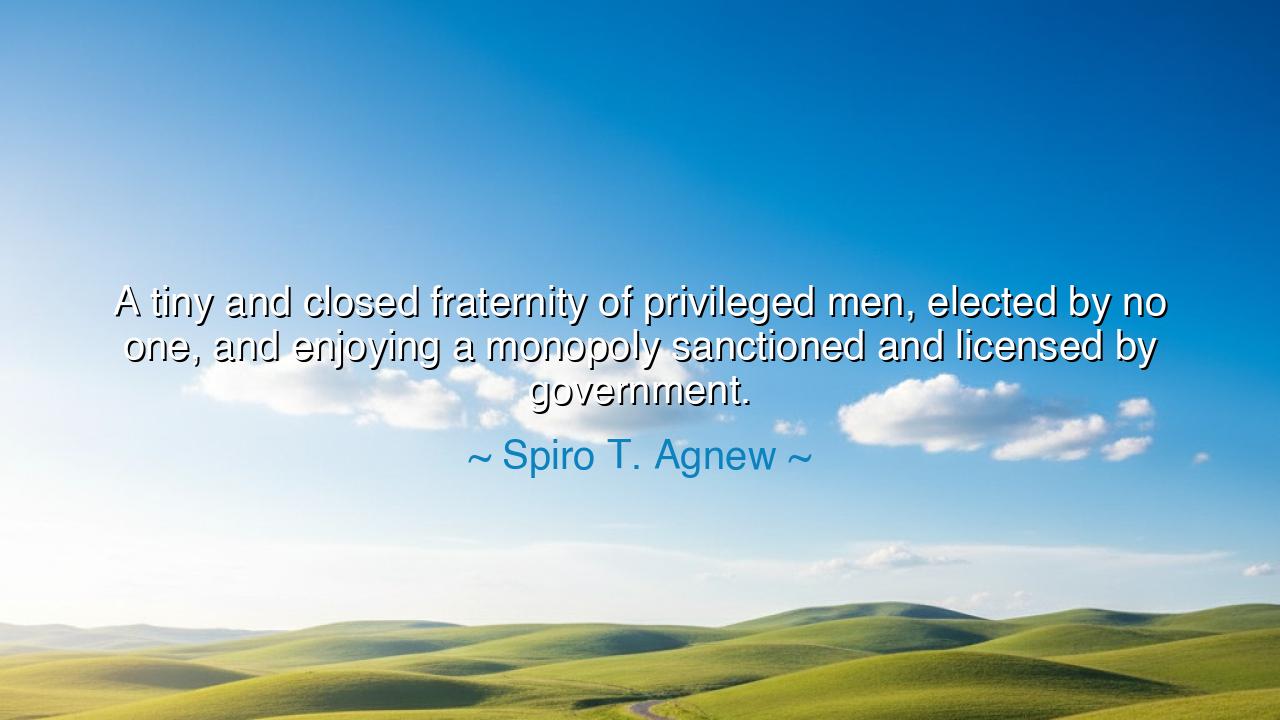
A tiny and closed fraternity of privileged men, elected by no
A tiny and closed fraternity of privileged men, elected by no one, and enjoying a monopoly sanctioned and licensed by government.






The words of Spiro T. Agnew — “A tiny and closed fraternity of privileged men, elected by no one, and enjoying a monopoly sanctioned and licensed by government.” — strike like thunder across the vast landscape of public discourse. They are not the gentle musings of a scholar, but the sharp cry of a man who saw corruption creeping into the heart of democracy. In these words, Agnew, once Vice President of the United States under Richard Nixon, condemned what he perceived as the rise of a hidden aristocracy — a class of unelected elites, wielding influence not by the will of the people but by the favor of power. His was a warning to his age and to all ages: that the freedom of a nation is fragile, and it can be stolen not only by tyrants in uniform but by those who rule unseen, through privilege and control.
When Agnew spoke these words in 1969, his target was not a government of kings, but a government of information — the press, the media institutions that claimed to speak for the people yet were, in his eyes, answerable to none. He accused them of forming a “tiny and closed fraternity,” a circle of privileged men shaping thought, steering opinion, and defining truth itself. Though his language was sharp, his meaning reached beyond the quarrel of his day. He touched upon an eternal danger — that when power gathers in secret, when influence is concentrated in the hands of a few, liberty begins to fade. Whether that power rests in armies, courts, or pens, its effect is the same: the many become ruled by the few, and the voice of the people is drowned beneath the whispers of privilege.
Agnew’s cry recalls the ancient warnings of philosophers and prophets who saw the same pattern in the empires of their time. The Greek historian Thucydides spoke of oligarchies that began with noble intent but soon turned inward, serving their own wealth and security. The Roman Republic, too, fell not only to the sword of Caesar but to the complacency of its elite — senators who believed their class alone was fit to govern, while the plebeians’ cries for justice went unheard. When power is detached from accountability, when rulers — or influencers — are “elected by no one,” the republic withers. The face of tyranny changes through time, but its spirit remains the same: the concentration of power without the consent of the governed.
There is a deeper wisdom hidden in Agnew’s words, a warning not only about the press but about the nature of power itself. Every institution, no matter how noble its birth, tends toward self-preservation. The press, the clergy, the guild, even the academy — all can become “closed fraternities,” guarding privilege and silencing dissent. And when the government, rather than restraining such monopolies, sanctions and licenses them, the corruption deepens. For then the people, in whose name freedom was won, become spectators rather than participants. Their right to question, to know, to judge — all are filtered through gatekeepers who claim to speak for them but serve themselves.
Yet Agnew’s warning, like all wisdom, must not be twisted into resentment or despair. His purpose was not to destroy the press or to silence speech, but to awaken vigilance. A free society cannot survive if it blindly trusts any power — not the government, not the media, not even its own heroes. Freedom demands discernment. The citizens of a republic must remain awake, alert to the subtle rise of new monopolies, whether they appear in boardrooms, in bureaucracies, or in the halls of information. For the greatest threat to liberty is not the tyrant who seizes power by force, but the one who claims it for “the good of the people” and hides behind noble words.
History offers a mirror to this truth. In the early days of Napoleon Bonaparte, France believed it had found a savior — a man who would preserve the ideals of the Revolution. Yet when Napoleon took control of the press, silenced opposition, and allowed only approved voices to speak, the spirit of freedom died though the nation still called itself free. Thus, every generation must remember: liberty is not protected by titles or slogans, but by the courage to question those who claim to speak in its name. The “tiny fraternity” Agnew described will always return in new forms — the powerful few who shape the minds of the many. The duty of a free people is to break their monopoly with truth, with vigilance, and with courage.
So let this be the teaching for all who would remain free: never surrender your right to think, to question, to seek truth for yourself. Do not allow any class — political, intellectual, or media — to become the sole interpreter of reality. Freedom is not kept by obedience, but by awareness. The true guardian of democracy is not the ruler or the reporter, but the citizen — watchful, informed, and unafraid.
And thus, remember the lesson of Agnew’s words: when a “tiny and closed fraternity” begins to define truth, the first duty of the people is not to submit, but to see. For tyranny begins not with chains, but with blindness — and freedom endures only in the hearts of those who keep their eyes open and their minds their own.






AAdministratorAdministrator
Welcome, honored guests. Please leave a comment, we will respond soon